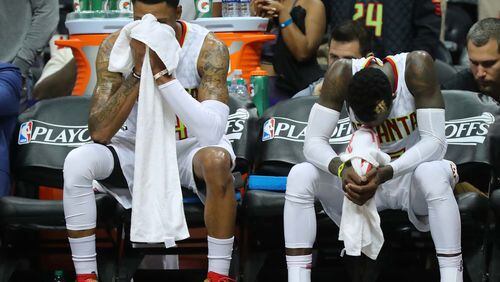Two years ago, the Hawks won two playoff series. Last year, they won one. This year, none. Sometimes you don’t need advanced analytics to tell you there’s a problem.
The Hawks didn't just lose a game and a series to the Washington Wizards on Friday night. They affirmed in defeat that, despite generally exceptional coaching, despite solid effort, they have a flawed team resulting from two years of poor roster construction since the run to the Eastern Conference finals in the 2014-15 season.
The team that trailed by 22 points early in the third quarter at home in an elimination game, the team that walked off the court at Philips Arena a 115-99 loser in the game and a 4-2 loser in an opening-round series, can’t closely resemble the squad that returns next season. Because if it does, the downward spiral will continue.
Owner Tony Ressler’s efforts to build a championship team and grow a jaded fan base will fail without significant change. Impending arena renovations, a new practice facility and a D-League team aren’t going to change that.
Ressler said in an extensive interview last week that he believed these Hawks were deeper and superior to the one that won 60 games and went to the Eastern Conference finals for the first time in franchise history.
“We’re more playoff ready. We just haven’t shown it yet,” he said
I’m not sure if he really believed that or he just didn’t want to say anything publicly that might be construed as criticism and upset those on his payroll. Either way, he was wrong.
The Hawks, whose regular-season win total has dropped each of the past two seasons, was bounced in the first round for the first time in three years. Furthermore, center Dwight Howard, the offseason’s major acquisition sat for the entire fourth quarter for the second time in this series.
In six fourth quarters in the series, Howard played a total of 16 minutes, 32 seconds out of a possible 72 minutes. That gives you some indication about how important coach Mike Budenholzer considers him down the stretch of games. The problem: Budenholzer is the one who brought him here.
This team — which lacks consistent offensive flow, outside shooting and a dependable, consistent performer outside of All-Star Paul Millsap — committed 22 turnovers in a must-win game.
Meanwhile, three key pieces from the 60-win team of 2014-15 move on. Al Horford and No. 1-seeded Boston will meet Washington in one conference semifinal. Kyle Korver and No. 2 Cleveland will face DeMarre Carroll and No. 3 Toronto in the other semi. Hawks fans can watch and remember what successful postseason basketball looks like.
The Hawks trailed by 19 points at halftime. “We obviously didn’t play very well in the first half and we dug ourselves a big hole,” Budenholzer said.
They didn’t quit. So there’s that. They started making shots and stopped help Washington so much with errant passes. When Kent Bazemore — trying to make amends for five first-half turnovers and seven in the game — made a 3-pointer, it was a four-point game for the first time since early in the second.
It was 93-90 when Dennis Schroder drove in for an expected layup that would cut the lead to one point. But John Wall, the best player on the court, the best player in this series, chased him down and blocked the shot.
“That’s the sign of a championship player,” Wizards coach Scott Brooks said.
The Hawks could use a couple of those.
Wall finished with a layup at the other end of the court. He followed moments later with a jumper and suddenly the lead was back to seven points. The Hawks were dead. From the time of the Wall block, the Hawks were outscored 22-9 the rest of the game.
“We wanted to do to them what they did to us two years ago,” Wall said. The reference was to a second-round playoff series that was won by the Hawks 4-2 and clinched on the Wizards’ home court.
Washington is a good team, not a great one. So the fact that the Hawks took them to six games was not surprising. But this game looked like too many games this season. Turnovers, struggles to maintain any flow on offense, lapses on defense.
The Wizards closed the first half with a 19-4 run (fueled by six Hawks’ turnovers) to take a 19-point lead at 65-46. It takes at least two things for that kind of tilt to happen on the scoreboard: One team has to be really good, one really bad. Both complied.
The really good: by Wall and Bradley Beal. They combined for 37 points on 15-of-22 shooting in the first two quarters. (Wall finished with 42, Beal with 31.)
The really bad: by the Hawks, who committed 15 turnovers in the half, leading to 20 Wizards points. Bazemore and Howard each had five.
Emotion wasn’t a problem. A Bazemore turnover led to a fast break and a Beal dunk. Beal tumbled into the crowd after the basket and immediately jumped up and bumped Bazemore, whom he believed gave him a nudge to cause the fall. What unfolded was a scrum between the two teams with four players — Bazemore and Howard of the Hawks, Beal and Jason Smith of the Wizards — getting technical fouls.
It wasn’t quite the 1980s NBA, but it worked for a little excitement. On this night, it was a relative Hawks highlight. Not that long ago, the highlight was a win.






